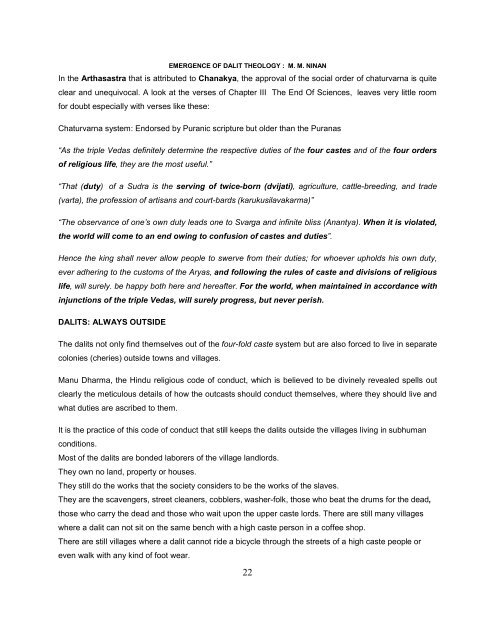Dalit Theology2
You also want an ePaper? Increase the reach of your titles
YUMPU automatically turns print PDFs into web optimized ePapers that Google loves.
EMERGENCE OF DALIT THEOLOGY : M. M. NINAN<br />
In the Arthasastra that is attributed to Chanakya, the approval of the social order of chaturvarna is quite<br />
clear and unequivocal. A look at the verses of Chapter III The End Of Sciences, leaves very little room<br />
for doubt especially with verses like these:<br />
Chaturvarna system: Endorsed by Puranic scripture but older than the Puranas<br />
“As the triple Vedas definitely determine the respective duties of the four castes and of the four orders<br />
of religious life, they are the most useful.”<br />
“That (duty) of a Sudra is the serving of twice-born (dvijati), agriculture, cattle-breeding, and trade<br />
(varta), the profession of artisans and court-bards (karukusilavakarma)”<br />
“The observance of one’s own duty leads one to Svarga and infinite bliss (Anantya). When it is violated,<br />
the world will come to an end owing to confusion of castes and duties”.<br />
Hence the king shall never allow people to swerve from their duties; for whoever upholds his own duty,<br />
ever adhering to the customs of the Aryas, and following the rules of caste and divisions of religious<br />
life, will surely. be happy both here and hereafter. For the world, when maintained in accordance with<br />
injunctions of the triple Vedas, will surely progress, but never perish.<br />
DALITS: ALWAYS OUTSIDE<br />
The dalits not only find themselves out of the four-fold caste system but are also forced to live in separate<br />
colonies (cheries) outside towns and villages.<br />
Manu Dharma, the Hindu religious code of conduct, which is believed to be divinely revealed spells out<br />
clearly the meticulous details of how the outcasts should conduct themselves, where they should live and<br />
what duties are ascribed to them.<br />
It is the practice of this code of conduct that still keeps the dalits outside the villages living in subhuman<br />
conditions.<br />
Most of the dalits are bonded laborers of the village landlords.<br />
They own no land, property or houses.<br />
They still do the works that the society considers to be the works of the slaves.<br />
They are the scavengers, street cleaners, cobblers, washer-folk, those who beat the drums for the dead,<br />
those who carry the dead and those who wait upon the upper caste lords. There are still many villages<br />
where a dalit can not sit on the same bench with a high caste person in a coffee shop.<br />
There are still villages where a dalit cannot ride a bicycle through the streets of a high caste people or<br />
even walk with any kind of foot wear.<br />
22


















